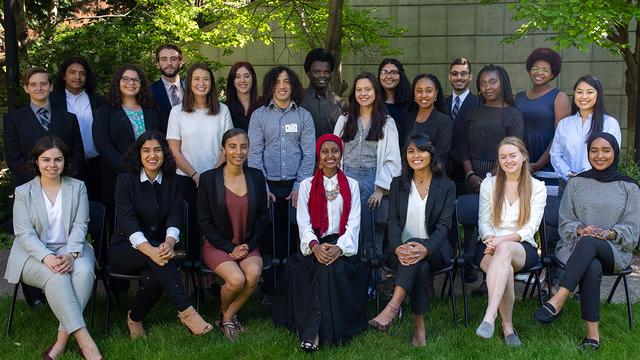The Humphrey School of Public Affairs this week welcomed nearly two dozen college students from around the country to explore their interests in public policy through the Junior Summer Institute (JSI) program.
The JSI is an intensive six-week training experience designed to prepare rising senior undergraduate students—mostly from underrepresented communities—to thrive in master’s degree programs and launch careers in public service. This is the fifth year that the Humphrey School has hosted a JSI; as with last year, the program is entirely online.
The 21 students in this year’s cohort come from Minnesota and 12 other states—Arizona, California, Illinois, Kansas, New York, Pennsylvania, Rhode Island, South Carolina, Texas, Washington DC, and Wisconsin. Some are the first generation in their families to attend college. They all share a desire to work in public service and a commitment to advancing the common good.
Humphrey School Dean Laura Bloomberg says she is inspired by the students who participate in the program.
“We expect a lot of these students, and time and again they have risen to the challenge, overcome obstacles, and demonstrated that this preparatory program really does attract highly talented future public policy leaders. I expect this year's cohort will be no different,” Bloomberg says. “It speaks to their character and determination that these students are choosing to dedicate so much of their summer to their own scholarly and professional development.”
The program equips the fellows with leadership and management skills, problem-solving techniques, and an understanding of how to analyze data when making critical decisions to help address complex social challenges.
The JSI was launched several years ago to address the lack of diversity across the spectrum of professional public service, including government, nonprofits, public policy institutions, and international organizations. Bloomberg says having more diverse leaders in public policy is even more important as communities around the country seek to address inequities in public safety, education, health care, and other systems.
“As we are still reckoning with the deep racial inequities laid bare after the death of George Floyd a year ago, we welcome the JSI program with a sense of urgency and dedication to its mission of promoting the inclusion and full participation of underrepresented groups in public service,” says Bloomberg.
Over the next six weeks, the JSI participants will take courses on policy analysis and statistics, get help preparing to apply to graduate school, and meet with policy leaders from diverse backgrounds. They will also conduct research and community engagement projects focused on specific issues that inspire them the most.
Alumni say their experience in the JSI program helped them on their path to public service careers. Zaynab Abdi, who went through the program in 2019, earned her bachelor’s degree from St. Catherine University in St. Paul, and is now the civic engagement coordinator at Reviving Sisterhood, a Twin Cities nonprofit that supports Muslim women’s community involvement, leadership development, and advocacy.
Abdi said she enjoyed getting to know people in her JSI cohort who lived in different parts of the country. “I also loved the faculty who taught us and wanted us to learn, even though we might not have had a lot of experience in some of the subject areas. I had a great experience.”
The University of Minnesota is one of five universities in the U.S. to host a JSI, which is part of the Public Policy and International Affairs (PPIA) Fellowship. It provides full funding for participants and often leads to generous financial aid packages at participating schools. The others are Carnegie Mellon University, Princeton University, the University of Michigan, and the University of California, Berkeley.


